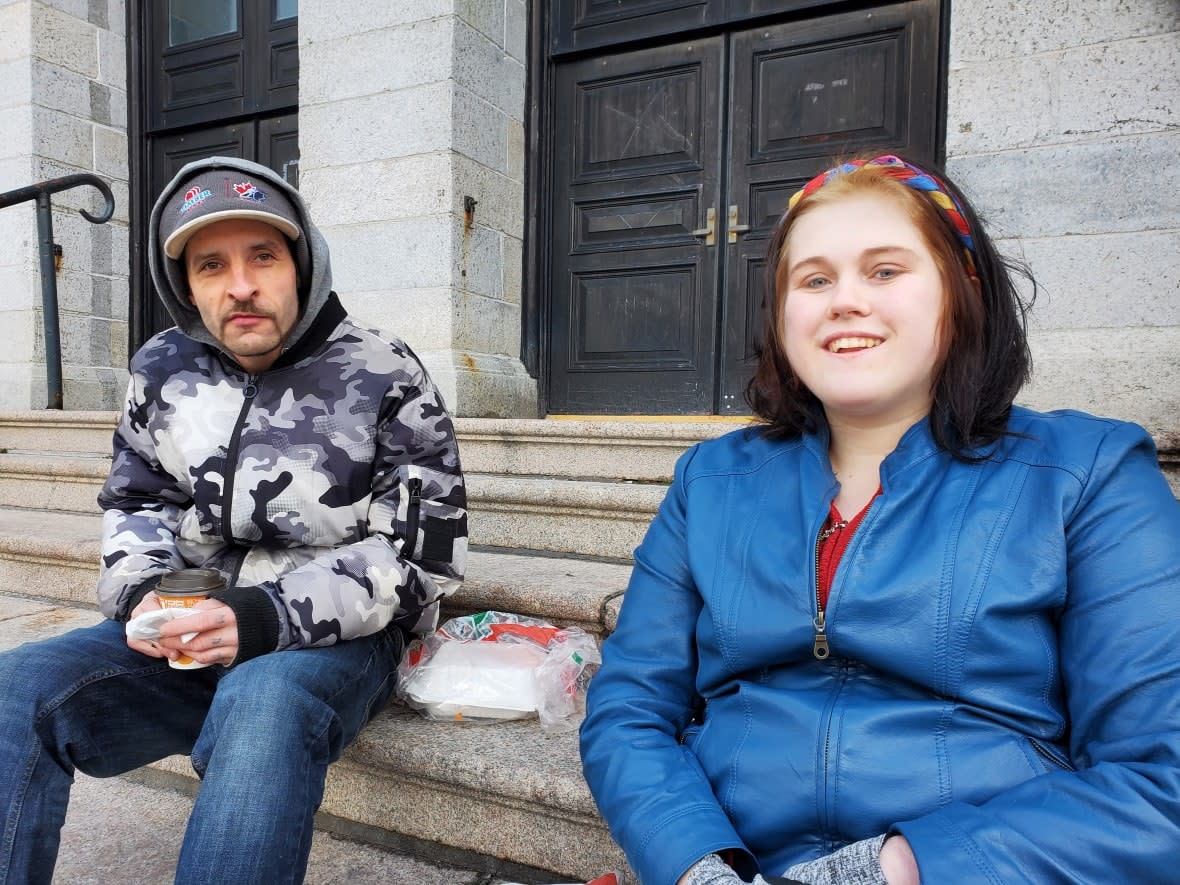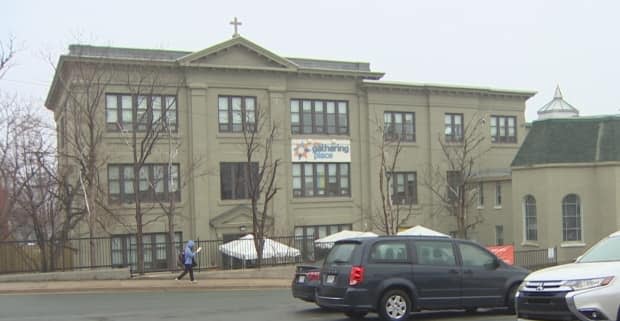Dark times and bouncing between shelters: Meet 2 people who know what it's like to be homeless


Brooklyn Howell sits on the steps of the Basilica Cathedral in downtown St. John's, eating a takeout lunch from the Gathering Place. She and her boyfriend, Barry Constantine, are two of about 2,000 people who rely on the meals, emergency shelter, and other supports offered at the community health centre.
"As a recovering person, as an addict, sometimes I come down and get a bit of a meal," Howell says. "They actually helped me through a lot of my dark times."
Howell is just 20 years old. She smiles while telling her story. But when Howell talks about her "darkest times" — and it's a phrase she uses often — she isn't exaggerating.
At 18, Howell said she became homeless after fleeing abuse — first at a group home, and then while living with someone else.
"They ended up hurting me, and I left and that's why I became homeless," Howell said. Around the same time, she also landed in hospital due to complications from diabetes. Howell's health recovered before too long, thankfully, and with her boyfriend by her side, and help from her social worker, she managed to find housing.
She credits her social worker for saving her life.
"And it was my darkest times but I got through it, you know what I mean?"
If they have a bed available, you don't get to say no. Well, you can — but you're going to be on the street. - Adam Hollett
With a place to call home, Howell said she's doing much better these days. But though she receives income support, Howell said it doesn't cover the rising cost of groceries.
"That's why people are starting to do criminal activity, because things have gone up," she said.
Howell said she understands where people are coming from.
"I don't think they want to do it. It's just something they have to do because of how hungry they are. And just like people with their addictions, and then they're also hungry — 'cause there's not like enough coverage on everything, you know what I mean?" she said.
LISTEN | Brooklyn Howell and Adam Hollett open up about experiencing homelessness in St. John's:
Bouncing between shelters after 'begging for help' at the Waterford
Adam Hollett crosses the Basilica parking lot after eating his lunch at the Gathering Place. For the most part, he comes to the Gathering Place for meals, though he also uses the centre's free clothing boutique.
Just a couple of weeks ago, Hollett found a place to live in St. John's. But prior to this, he spent several weeks bouncing from homeless shelter to homeless shelter in the city.
"It's really luck of the draw where you get in," Hollett said. "Like if they have a bed available, you don't get to say no. Well, you can — but you're going to be on the street."
As he describes the first shelter he stayed in, Hollett clears his throat.
"It was eye-opening, to say the least," Hollett says. "It was extremely dirty. I don't know if it's ever been clean. Like there was black mould growing in the carpets. There was, you know, open drug use. Open."

Like Howell, Hollett is visibly relieved to have found a home. His search for housing has come with its share of twists and turns, including a stint two hours away in Clarenville, where rental prices are cheaper than in St. John's. But without a vehicle in Clarenville, Hollett found it hard to get around — and eventually, his roommate told him to leave and sort out his mental health.
"My roommate out there said that, you know, kind of no hard feelings, but wanted me to get better before I came back," Hollett explained. He ended up back in St. John's at the Waterford Hospital. But after two days, Hollett said hospital staff sent him to the Gathering Place.
"So I showed up here with my bags and didn't know where to go … and they pointed me down to Stella's Circle and got me on the housing crisis line," said Hollett.
It wasn't Hollett's first time unsuccessfully seeking mental health treatment at the Waterford, he said, and in his eyes, he's one of many people at the Gathering Place in urgent need of mental health care.
"That's a lot of what I see down here," Hollett said.
"There's people here that have untreated mental issues and it's sad to see, right? I've been extremely disappointed with the efforts of me going back and forth to the Waterford and them really doing nothing for me."
In a statement, Eastern Health said when an individual comes to the psychiatric assessment unit of the Waterford Hospital with mental health concerns, that individual "would not be turned away from the PAU [psychiatric assessment unit] without an assessment."
The statement also said admission to hospital may not be the best clinical option for every individual, and "while the PAU can provide followup and supports for individuals who experience homelessness related to mental illness, as a health care facility, the Waterford Hospital is not able to provide shelter."
More petty crime among 'cascading effects' of homelessness
Demand has more than doubled at the Gathering Place since 2019, according to executive director Paul Davis. In a recent interview, Davis said the need for emergency shelter is also climbing at the Gathering Place and, these days, the centre turns away about two people a night.
"[It's] really difficult for our staff to, you know, have to stop someone at the door, especially with ... the colder weather coming. But it's the reality today that with the turn in the economy, there are certainly increased pressures on the services we provide," Davis said.
The number of people experiencing homelessness is "starting to hit a real boiling point" in the metro area, according to End Homelessness St. John's executive director Doug Pawson. At the moment, Pawson said, there are about 140 to 160 shelter beds in St. John's — and in September, Pawson's organization knew of about 230 people in the city experiencing homelessness.

As the weather gets colder, Pawson said some people who can't find beds are sleeping in bank lobbies, while others are resorting to increasingly desperate measures.
"We're seeing folks who are, you know, committing petty crimes, essentially. You know, breaking a car window or breaking a window to essentially go to lockup for the night, because the alternative of sleeping on the streets is not better," Pawson said.
"We're seeing a lot of that in communities around St. John's. And so these things are just, you know, sort of cascading effects of what the symptoms of homelessness look like."
More accessible mental health care, supportive housing and emergency shelters are needed to address the situation, Pawson said. But while there's never been more people in need of help, Pawson said his organization is managing to find housing for people, even in light of the city's tight rental market.
"What we are seeing is folks, once they're housed and with supports — very [few] are returning back into homelessness. So there are ways to think about this differently," he said.
Helping others who are struggling
After coming through her own struggle with homelessness, Brooklyn Howell is doing her best to help others find shelter, too. She's made room for three extra people to live in her house. She's even made space for a friend to sleep in her kitchen.
"I'm a lot more happy than what I used to be. Because I got a good strength in people," Howell said.
"I know what it's like to be homeless and not have anywhere to go and be in the cold myself, you know what I mean? So I'm hoping people get what they deserve and they get the life they need."
Read more from CBC Newfoundland and Labrador

 Yahoo Movies
Yahoo Movies 
